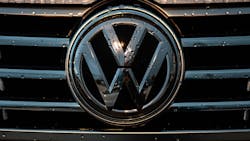EU Countries Warn of Volkswagen Scandal Fallout
BRUSSELS, Belgium—Several EU member states including major automaker France will urge Europe's pollution regulator to thoroughly assess the consequences of the Volkswagen emission scandal, according to a document seen by AFP Monday.
"The environmental dimension needs to be clearly assessed and highlighted," said the letter, which was addressed to the EU's 28 environment ministers ahead of talks on October 26 in Luxembourg.
"The case could have a direct bearing on the total emissions of a country, and might have an impact on efforts by all member states to fulfill their (emission) obligations ... and meet air quality standards in the EU," the letter said.
The letter, dated Monday, was written by Austria and Denmark and officially backed by France, the Netherlands, Slovenia and Luxembourg. It did not involve Germany, the home of Volkswagen that is under fire for massive cheating on emission tests.
The actual target of the letter is the European Commission, the EU's regulatory arm that sets emission rules across the 28-country bloc, but without any power of oversight, which remains with national authorities.
The Commission must "give a concise overview of the actions and measures being taken to clarify the magnitude of the manipulation of diesel cars," the letter said.
The seven countries also urged the swift introduction of real-driving tests that are widely known to stamp out the sophisticated cheating carried out by Volkswagen in laboratory tests.
At issue is the date when the real driving tests should be enforced and what delay should be allowed before emission limits are policed fully.
The introduction of these tests "needs to be taken forward more quickly," the letter said.
Officially, the real-life tests will begin in January, but only for reference.
The Commission proposal, which remains unofficial, allows car companies until 2019 to fully implement the new standard, a delay seen as unjustified by activists.
In its own letter to ministers, Belgium said full implementation should take place no later than 2017.
But the pressure on European governments to not overly upset the auto industry is huge, especially as the economic fallout of the VW scandal remains unknown.
According to industry data, the auto sector is responsible for about 12 million jobs across the EU, where economic growth remains sluggish and joblessness is still a concern.
Copyright Agence France-Presse, 2015
About the Author
Agence France-Presse
Copyright Agence France-Presse, 2002-2025. AFP text, photos, graphics and logos shall not be reproduced, published, broadcast, rewritten for broadcast or publication or redistributed directly or indirectly in any medium. AFP shall not be held liable for any delays, inaccuracies, errors or omissions in any AFP content, or for any actions taken in consequence.
